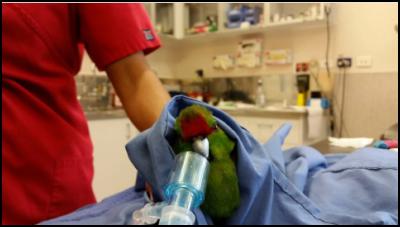Kākāriki receiving treatment at The Nest Te Kōhanga
8 July 2016
Kākāriki receiving treatment at The Nest Te Kōhanga

Kākāriki being treated at The Nest Te Kōhanga.
An injured
nationally vulnerable Kākāriki has been receiving care at
Wellington Zoo after it was found with severe wounds to the
right wing, thought to have been caused by a cat.
Originally hatched at Zealandia Wildlife Sanctuary in March, the male Kākāriki was brought in by a member of the community and is receiving treatment from the Veterinarian Team at The Nest Te Kōhanga.
“When the Kākāriki arrived at The Nest Te Kōhanga, our initial physical exam showed the bird had a lot of wounds and bruising over his body including a large deep wound to the underside of his right wing, plus many primary and tail feathers were missing,” said Senior Veterinarian Dr Baukje Lenting. “The bird’s wounds are consistent with a cat attack, so we are treating him with antibiotics to prevent infection to his right wing, and pain relief and anti-inflammatories for the bruising and swelling.”
“We’ve dressed and bandaged its wing to help it mend, and we’re also giving it physio about twice a week under a general anaesthetic,” said Dr Lenting. “With ongoing treatment and rehabilitation, we are hopeful that the bird will regain its strength to be able to be released back to the wild.”
The Kākāriki will remain at The Nest Te Kōhanga for ongoing treatment and care for the next few weeks until the bird’s wing has healed and finished its therapy.
“We hope to release the bird once it is healed and fit
to fly, as saving native wildlife is a crucial part of the
work we do at The Nest Te Kōhanga,” said Dr Lenting.
Native species make up at least 70% of patients at The Nest Te Kōhanga, and patients are usually brought in by local members of the community, the SPCA, the Department of Conservation and Zealandia.
“We work together with the community and other organisations to ensure these animals get the treatment and care they need, and ultimately return them to the wild,” said Dr Lenting.
“The community can help protect our native birds like the Kākāriki by keeping their cats inside at night and making sure your cat is desexed.”
ends


 Gordon Campbell: On The Left’s Electability Crisis, And The Abundance Ecotopia
Gordon Campbell: On The Left’s Electability Crisis, And The Abundance Ecotopia NZCAST: NZCAST Leads Ongoing Cross-Agency Collaboration To Break Down Barriers For Survivors Of State Abuse
NZCAST: NZCAST Leads Ongoing Cross-Agency Collaboration To Break Down Barriers For Survivors Of State Abuse Regional and Unitary Councils Aotearoa: Regional And Unitary Councils Back A Practical FWFP System
Regional and Unitary Councils Aotearoa: Regional And Unitary Councils Back A Practical FWFP System NZ Government: Stay Safe On Our Roads This Easter
NZ Government: Stay Safe On Our Roads This Easter YWCA: Global Push Back Against Gender Equality A Growing Crisis In Aotearoa
YWCA: Global Push Back Against Gender Equality A Growing Crisis In Aotearoa Te Pāti Māori: Ngarewa-Packer - Fast-Tracking Seabed Mining Ignores Māori Opposition And Environmental Precedent
Te Pāti Māori: Ngarewa-Packer - Fast-Tracking Seabed Mining Ignores Māori Opposition And Environmental Precedent New Zealand Defence Force: Defence And Customs Strengthen Maritime Security With Uncrewed Surface Vessels
New Zealand Defence Force: Defence And Customs Strengthen Maritime Security With Uncrewed Surface Vessels


